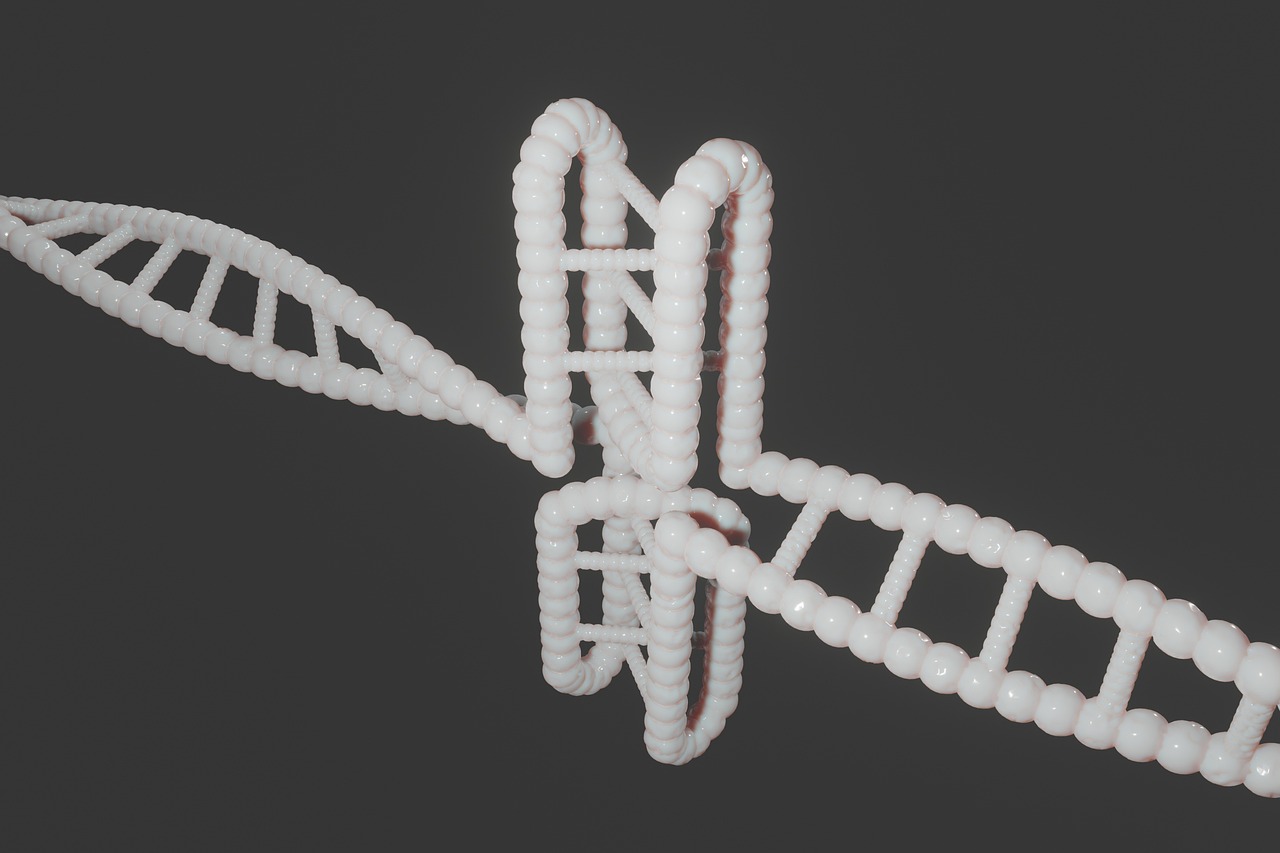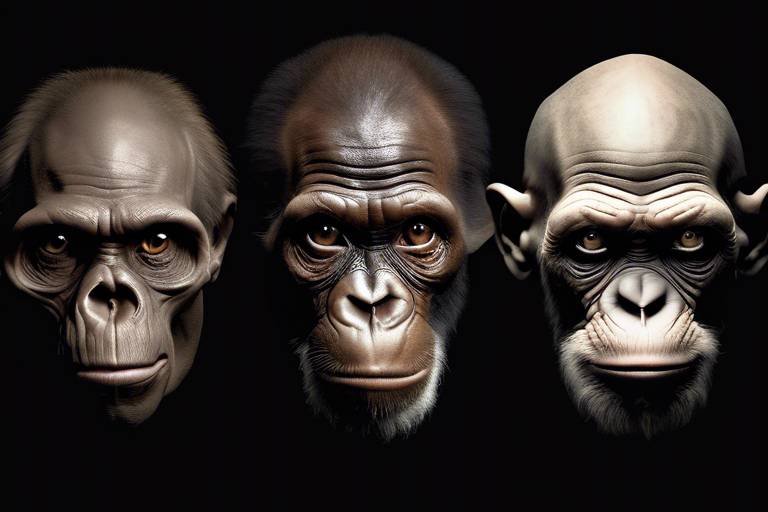Epigenetics - A New Window for Philosophy of Biology
Imagine a world where the age-old debates about nature versus nurture take on a whole new dimension. Welcome to the fascinating realm of epigenetics, a field that is not just reshaping our understanding of biology but also challenging the very foundations of philosophical thought. At its core, epigenetics explores how environmental factors can influence gene expression without altering the underlying DNA sequence itself. This means that our experiences, lifestyle choices, and even the air we breathe can leave a mark on our genes, potentially affecting generations to come. It’s like having a remote control for your genetic makeup, where the environment can adjust the volume of gene expression, turning certain traits up or down based on external stimuli.
The implications of epigenetics extend far beyond the confines of biology; they plunge into the depths of philosophy. Traditional views that strictly separate heredity and environment are being blurred. What does it mean to be "you" if your identity is shaped not just by your genetic code but also by the myriad of experiences that influence how those genes are expressed? This new understanding invites us to reconsider fundamental questions about identity, free will, and the very essence of being alive.
As we delve deeper into this topic, we will uncover how epigenetics acts as a bridge between biology and philosophy, prompting us to rethink our assumptions about life itself. Are we merely the sum of our genes, or is there a more complex interaction at play? This article will explore these questions and more, revealing how epigenetics opens a new window into the philosophy of biology, inviting both scientists and philosophers alike to engage in a dialogue that could redefine what it means to be human.
To truly appreciate the philosophical implications of epigenetics, we first need to grasp the basics. Epigenetics refers to the study of changes in organisms caused by modification of gene expression rather than alteration of the genetic code itself. Think of it as the software that runs on the hardware of our DNA. Key mechanisms involved in epigenetic regulation include DNA methylation and histone modification. These processes can turn genes on or off, effectively controlling how cells read the genes.
For instance, when a gene is methylated, it is often silenced, meaning that it won't be expressed. Conversely, histone modification can influence how tightly or loosely DNA is wrapped around histones, affecting accessibility for transcription. This dynamic system allows for a remarkable level of adaptability, enabling organisms to respond to their environments in real-time. It’s like having a dimmer switch for your genetic traits, allowing for a spectrum of expression rather than a binary on/off scenario.
Now, let’s talk about the environment's role in this intricate dance of gene expression. Environmental factors such as diet, stress, and toxins can significantly impact epigenetic changes. For example, a diet rich in certain nutrients can promote beneficial epigenetic modifications, while exposure to pollutants may lead to harmful changes. This interplay illustrates that our genes are not static; they are influenced by the world around us.
Consider this: if you were to live in a polluted city versus a clean countryside, your epigenetic profile could differ dramatically. This raises profound questions about health disparities and the importance of creating environments conducive to well-being. It’s a reminder that we are not just passive recipients of our genetic inheritance; we are active participants in shaping our biological destinies.
But wait, there’s more! The concept of epigenetic inheritance takes us even further down this rabbit hole. It suggests that traits can be passed down through generations not solely based on DNA sequence but also through epigenetic modifications. This means that the experiences of our ancestors could influence our own gene expression. Imagine inheriting not just your grandmother's eye color but also the effects of her diet, stress levels, and environmental exposures.
Various animal studies have shed light on the effects of epigenetic changes on behavior and physiology. For instance, research on mice has shown that those exposed to high-stress environments can pass on epigenetic markers that affect the stress responses of their offspring. This opens up a world of possibilities regarding evolution and adaptation, suggesting that the survival of the fittest may not just be about genetic advantages but also about the epigenetic legacy we leave behind.
When it comes to humans, the stakes are even higher. Studies have indicated that epigenetic factors contribute to diseases such as cancer and mental health disorders. Understanding these mechanisms is crucial for medical advancements, as it could lead to targeted therapies that address not just the symptoms but the underlying epigenetic causes. It’s like finding the root of a weed instead of just trimming the leaves; true change comes from the ground up.
With all this information, we must ask ourselves: what does it mean for our identity? If our genes can be influenced by our environment and experiences, how do we define ourselves? Are we merely products of our biology, or do we have the agency to shape our destinies? These questions challenge traditional views in biology and philosophy, urging us to reconsider the relationship between our biology and our perceived free will.
As with any groundbreaking field, epigenetics brings ethical dilemmas to the forefront. Concerns about genetic privacy, the potential for discrimination based on epigenetic profiles, and the implications of manipulating epigenetic factors in humans are critical discussions we must engage in. It’s essential to navigate these waters carefully to ensure that scientific advancement does not come at the cost of ethical integrity.
To address these concerns, there is a pressing need for policies to govern epigenetic research and applications. Regulations should aim to ensure ethical practices while promoting scientific advancement in this rapidly evolving field. It’s like setting the rules of the game before playing; without a framework, we risk chaos in the pursuit of knowledge.
Looking ahead, the future of epigenetics is brimming with potential. Researchers are speculating about therapeutic applications that could revolutionize medicine. Imagine treatments that could reverse harmful epigenetic changes or enhance beneficial ones. The integration of epigenetic principles into biological and philosophical frameworks may redefine our understanding of life, health, and identity.
- What is epigenetics? - Epigenetics is the study of changes in gene expression that do not involve alterations to the underlying DNA sequence.
- How does the environment affect epigenetics? - Environmental factors like diet, stress, and toxins can induce epigenetic changes, influencing gene expression.
- Can epigenetic traits be inherited? - Yes, traits can be passed down through epigenetic modifications, not just genetic sequences.
- What are the ethical implications of epigenetic research? - Concerns include genetic privacy, discrimination, and the manipulation of epigenetic factors in humans.
- What are the future directions for epigenetics? - Future research may focus on therapeutic applications and integrating epigenetic principles into broader biological and philosophical discussions.

The Basics of Epigenetics
Epigenetics is like the conductor of an orchestra, guiding the performance of our genes without actually changing the music sheet. At its core, epigenetics refers to the study of changes in gene expression that do not involve alterations to the underlying DNA sequence. This fascinating field reveals how our environment, lifestyle, and experiences can influence our genetic makeup in profound ways. Think of it as a dimmer switch for your genes; while the wiring (DNA) remains intact, the brightness (gene expression) can vary dramatically based on external factors.
To understand epigenetics, it's essential to grasp a few key concepts and mechanisms that play a vital role in this complex interplay. The two primary mechanisms of epigenetic regulation are DNA methylation and histone modification. DNA methylation involves the addition of a methyl group to the DNA molecule, typically at cytosine bases, which can silence gene expression. On the other hand, histone modification refers to the chemical alterations of histone proteins around which DNA is wrapped. These modifications can either promote or inhibit gene expression, allowing for a dynamic response to environmental stimuli.
Here's a quick look at these mechanisms:
| Mechanism | Function | Impact on Gene Expression |
|---|---|---|
| DNA Methylation | Addition of methyl groups to DNA | Generally silences gene expression |
| Histone Modification | Chemical changes to histone proteins | Can either promote or inhibit gene expression |
What makes epigenetics particularly intriguing is its ability to bridge the gap between our genetic predispositions and the environments we inhabit. For instance, identical twins share the same DNA, yet they can exhibit different traits and health outcomes due to epigenetic variations influenced by their unique experiences and environments. This opens up a plethora of questions about the nature of identity and the extent to which we are shaped by our surroundings.
In essence, epigenetics challenges the traditional view that our genetic code is the sole determinant of who we are. It invites us to consider a more holistic perspective, where our life choices and environmental exposures play a crucial role in shaping our biology. As we delve deeper into this captivating field, we uncover the layers of complexity that define life itself, revealing that we are not merely products of our genes, but rather, dynamic beings influenced by a myriad of factors.

The Role of Environment
When we talk about epigenetics, it's impossible to ignore the profound impact of the environment on our biological makeup. It's like a dance between our genes and the world around us, where every step taken by the environment can lead to a different rhythm in gene expression. Imagine your genes as a musical score, and the environment as the conductor that influences how each note is played. This interplay is not just fascinating; it's crucial for understanding how we develop, adapt, and sometimes even struggle with various health issues.
Environmental factors can range from the food we eat to the stress we experience, and they can trigger epigenetic changes that alter gene expression without modifying the DNA sequence itself. For instance, DNA methylation and histone modification are two key mechanisms through which these changes occur. When certain environmental stimuli are present, they can lead to chemical modifications that either promote or inhibit the transcription of specific genes. This means that our lifestyle choices and external conditions can literally rewrite the script of our genetic story.
Consider this: if you were to adopt a healthier diet rich in fruits and vegetables, not only are you nourishing your body, but you are also potentially influencing your epigenetic landscape. On the flip side, exposure to toxins or chronic stress can have detrimental effects, leading to negative epigenetic modifications that might predispose you to certain diseases. It’s a reminder that we are not merely victims of our genetic inheritance; we are active participants in shaping our biological destiny.
To illustrate this dynamic interaction between genes and environment, let's take a closer look at some specific factors:
- Diet: Nutritional choices can impact epigenetic mechanisms. For example, folate-rich foods can influence DNA methylation patterns.
- Stress: Chronic stress can lead to changes in gene expression that may affect mental health and overall well-being.
- Toxins: Exposure to environmental pollutants can result in harmful epigenetic modifications that may increase the risk of diseases.
In essence, the environment acts like a sculptor, chiseling away at the raw material of our genetic code to create a unique masterpiece. This sculpting process is not static; it can change throughout our lives, influenced by our experiences and surroundings. Such insights not only deepen our understanding of biology but also raise important questions about the nature of health and disease. Are we simply products of our genes, or do our choices and environments play an equally significant role?
As we delve deeper into the implications of epigenetics, it becomes increasingly clear that the relationship between environment and genetics is a two-way street. Our genetic predispositions can influence how we respond to environmental factors, and conversely, our surroundings can modify how our genes express themselves. This intricate web of interactions challenges traditional notions of heredity and identity, suggesting that we are shaped by a complex interplay of both nature and nurture.
In conclusion, understanding the role of the environment in epigenetics not only enriches our appreciation of biological complexity but also empowers us to make informed choices that could enhance our health and well-being. As we continue to explore this fascinating field, we are reminded that while our genetic code provides a blueprint, it is the environment that colors our experiences and ultimately shapes who we are.

Epigenetic Inheritance
When we think about inheritance, our minds often jump straight to the DNA sequence passed down from our parents. But what if I told you there's a whole new layer to this story? Welcome to the fascinating world of , where traits can be transmitted from one generation to the next not just through the genes themselves, but also through epigenetic modifications. This means that factors like how your grandparents lived, what they ate, and even their experiences can subtly influence who you are today.
So, how does this work? At its core, epigenetic inheritance involves changes in gene expression that occur without alterations to the underlying DNA sequence. These changes are often triggered by environmental factors and can lead to heritable traits. For instance, if a parent undergoes significant stress or experiences malnutrition, the epigenetic modifications that occur in their genome can be passed down to their offspring. Imagine a tree: while the trunk (the DNA) remains the same, the branches (the epigenetic markers) can grow in different directions based on the conditions they face.
Research has shown that epigenetic changes can influence a wide range of traits, from physical characteristics to behavioral tendencies. For example, studies on mice have revealed that exposure to certain environmental stressors can lead to changes in behavior that are inherited by subsequent generations. These findings raise intriguing questions about identity and heritability. If we inherit not just genes but also the marks of our ancestors' experiences, what does that mean for our understanding of free will and personal responsibility?
To illustrate this concept further, let’s consider a few key examples:
- Agouti Mice: Research involving agouti mice has shown that the color of their fur can be influenced by the diet of their mothers, which in turn affects the epigenetic markers that regulate gene expression. A diet rich in methyl donors can lead to darker fur, while a poor diet can result in lighter fur.
- Stress and Behavior: In a study on rats, researchers found that pups born to mothers who experienced high levels of stress exhibited heightened anxiety and altered stress responses. These behavioral traits were linked to epigenetic changes that were passed down.
- Human Studies: In humans, evidence suggests that trauma experienced by one generation can affect the mental health and stress responses of the next. This has been observed in children of Holocaust survivors, who show increased vulnerability to stress-related disorders.
This understanding of epigenetic inheritance not only reshapes our view of biology but also opens up new avenues for research and therapy. If we can identify the specific epigenetic markers associated with certain traits or diseases, we might one day be able to develop targeted interventions that can alter these markers, potentially leading to new treatments for conditions like obesity, depression, and even cancer.
As we delve deeper into the implications of epigenetic inheritance, we find ourselves at the intersection of biology, philosophy, and ethics. It challenges the traditional notion of a fixed genetic destiny, suggesting instead that our environment and life experiences can shape not only our lives but also the lives of future generations. This realization encourages us to think critically about how we live, the choices we make, and the legacies we leave behind.
In summary, epigenetic inheritance is a groundbreaking concept that invites us to reconsider the very foundations of heredity. It emphasizes the dynamic interplay between our genes and our environments, suggesting that we are all part of a larger narrative that transcends individual lifetimes. As we continue to explore this captivating field, one thing is clear: the story of inheritance is far more complex and beautiful than we ever imagined.
What is epigenetic inheritance?
Epigenetic inheritance refers to the transmission of traits from one generation to the next through epigenetic modifications rather than changes to the DNA sequence itself. This means that environmental factors can influence gene expression and be passed down to offspring.
How do environmental factors affect epigenetic changes?
Environmental factors such as diet, stress, and exposure to toxins can lead to epigenetic modifications that alter gene expression. These changes can potentially be inherited by future generations.
What are some examples of epigenetic inheritance in animals?
Studies on agouti mice and stressed rats have demonstrated how epigenetic changes can affect physical and behavioral traits, showcasing the impact of environmental conditions on inheritance.
Can epigenetic changes be reversed?
There is ongoing research into the potential for reversing epigenetic changes through lifestyle modifications or therapeutic interventions, which could have significant implications for treating various diseases.

Case Studies in Animals
When it comes to understanding the profound implications of epigenetics in the animal kingdom, several fascinating case studies stand out. These studies not only highlight the remarkable adaptability of animals but also provide a glimpse into how epigenetic mechanisms can influence behavior and physiology across generations. One of the most notable examples is the research conducted on agouti mice. These mice exhibit a range of coat colors, from brown to yellow, which is not solely determined by their genetic makeup but also by epigenetic factors. The presence of a methyl group attached to the DNA can silence the agouti gene, resulting in a brown coat, while the absence of this modification leads to a yellow coat. This simple change in gene expression can have profound implications on the health and survival of the mice, illustrating how epigenetics can shape not just appearance but also susceptibility to diseases like obesity and diabetes.
Another compelling study involves the case of the honeybee. In a colony, worker bees and queen bees share the same genetic code, yet they exhibit drastically different behaviors and physical attributes. This divergence is largely attributed to the diet of the larvae. Larvae that are fed royal jelly develop into queens, while those that are given a different diet become workers. This dietary influence triggers epigenetic changes that dictate the developmental path of the bees, showcasing the power of environmental factors in shaping not just individual organisms but entire communities.
Additionally, research on the European wall lizard has revealed how epigenetic mechanisms can facilitate rapid adaptation to environmental changes. In a study, lizards that were introduced to a new habitat with different predation pressures showed significant changes in behavior and morphology over just a few generations. These changes were linked to epigenetic modifications that allowed the lizards to adapt quickly without altering their underlying genetic code. This adaptability underscores the importance of epigenetics in evolutionary biology, suggesting that organisms can respond to environmental challenges in real-time through epigenetic adjustments.
To further illustrate the impact of epigenetics in animal studies, let's take a look at a summary table of key findings:
| Animal | Study Focus | Key Findings |
|---|---|---|
| Agouti Mice | Coat Color Variation | Epigenetic modifications influence gene expression, affecting health and disease susceptibility. |
| Honeybees | Dietary Influence on Development | Royal jelly triggers epigenetic changes leading to the development of queen bees. |
| European Wall Lizard | Rapid Adaptation | Epigenetic modifications enable quick behavioral and morphological changes in response to environmental pressures. |
These case studies illustrate a crucial point: the world of epigenetics is not just a realm of molecular biology but a dynamic narrative that intertwines genetics, environment, and evolution. As we delve deeper into these stories, it becomes clear that the implications of epigenetics extend far beyond the laboratory, influencing how we understand the very essence of life itself.
- What is epigenetics? Epigenetics refers to the study of changes in gene expression that do not involve alterations to the underlying DNA sequence.
- How does the environment affect epigenetics? Environmental factors such as diet, stress, and toxins can lead to epigenetic modifications that influence gene expression.
- Can epigenetic changes be inherited? Yes, epigenetic changes can be passed down through generations, affecting traits and behaviors in offspring.
- What are the implications of epigenetics for human health? Understanding epigenetic mechanisms can provide insights into diseases such as cancer and mental health disorders, potentially leading to new therapeutic approaches.

Human Epigenetics
When we talk about , we're diving into a fascinating realm where our genetic blueprint meets the intricate dance of environmental influences. Imagine your DNA as a beautifully crafted book, where every letter is perfectly in place; however, epigenetics is like the annotations, highlights, and notes in the margins that can change the way we interpret the story. These epigenetic modifications can significantly impact how our genes are expressed, leading to various health outcomes.
Research has shown that epigenetic factors play a crucial role in several diseases, particularly in complex conditions like cancer and mental health disorders. For instance, certain environmental exposures, such as smoking or a poor diet, can lead to epigenetic changes that increase the risk of developing cancer. This means that our lifestyle choices are not just about personal health; they can have profound implications on how our genes function. In fact, studies suggest that the epigenetic modifications can even be passed down to future generations, creating a ripple effect that influences health far beyond our own lives.
Moreover, understanding these mechanisms opens up new avenues for medical advancements. By targeting specific epigenetic changes, researchers are exploring innovative therapies that could reverse harmful gene expression. For example, the use of epigenetic drugs is becoming a promising area of study, particularly in oncology, where they could potentially turn off genes that promote cancer cell growth. This is not just a game-changer for treatment; it also raises intriguing questions about the future of personalized medicine and how we might tailor interventions based on an individual's unique epigenetic profile.
To illustrate the significance of human epigenetics further, let's take a look at some key areas where this research is making waves:
| Disease | Epigenetic Influence | Potential Treatment |
|---|---|---|
| Cancer | DNA methylation changes leading to tumor suppressor gene silencing | Epigenetic inhibitors |
| Depression | Stress-induced epigenetic modifications affecting neurotransmitter pathways | Targeting epigenetic enzymes |
| Cardiovascular diseases | Diet and lifestyle-induced epigenetic changes impacting inflammation | Dietary interventions and epigenetic modulators |
As we continue to unravel the complexities of human epigenetics, it's essential to remember that this field is still in its infancy. The implications of our findings are vast and could redefine how we approach health and disease. With every discovery, we inch closer to understanding not just how our genes work, but how they interact with the world around us, shaping our identities and health outcomes in ways we are only beginning to comprehend.
- What is epigenetics? Epigenetics is the study of changes in gene expression that do not involve alterations to the underlying DNA sequence. These changes can be influenced by environmental factors.
- How do environmental factors affect epigenetics? Environmental factors such as diet, stress, and exposure to toxins can lead to epigenetic modifications that can influence gene expression and potentially lead to diseases.
- Can epigenetic changes be inherited? Yes, some epigenetic changes can be passed down from one generation to the next, affecting the health and traits of offspring.
- What are the potential therapeutic applications of epigenetics? Epigenetic therapies aim to reverse harmful gene expression patterns, particularly in diseases like cancer and mental health disorders.

Philosophical Implications
Epigenetics is not just a scientific breakthrough; it opens up a treasure chest of philosophical questions that challenge our understanding of identity, free will, and what it means to be human. Imagine your genes as a script for a play, but epigenetics acts as the director, deciding how that script is performed. This raises a pivotal question: if our environment can influence gene expression, to what extent are we the authors of our own lives? Are our behaviors and traits merely the result of our genetic makeup, or do we have the power to shape our destinies through our choices and experiences?
The implications of epigenetics extend far beyond the laboratory. They touch on the very essence of our identity. Traditionally, we have viewed our DNA as a fixed blueprint, a predetermined path that dictates our physical and psychological traits. However, epigenetics introduces a level of fluidity to this concept. It suggests that our identities are not set in stone but are instead shaped by a complex interplay of genetic and environmental factors. This leads to profound questions: If our traits can be altered by lifestyle choices, can we truly claim ownership over our identities? What does it mean to be "you" if your very essence can be modified by external influences?
Furthermore, the relationship between biology and free will becomes increasingly intricate. If our environment can modify gene expression, how much control do we really have over our actions? This raises ethical dilemmas about responsibility. For instance, if a person develops a mental health disorder influenced by their environment, to what extent can we hold them accountable for their behavior? The lines between nature and nurture begin to blur, creating a philosophical conundrum that challenges the foundations of morality and ethics.
To illustrate these philosophical implications, consider the following key points:
- Identity: Epigenetics suggests that our identities are not solely defined by our DNA but are also influenced by our life experiences.
- Free Will: The extent to which we control our actions and decisions is questioned, as environmental factors play a significant role in shaping our behavior.
- Responsibility: With the understanding that our genetics may not be entirely deterministic, the concept of moral responsibility comes into play.
As we delve deeper into the world of epigenetics, we are compelled to rethink our assumptions about life itself. The dynamic nature of gene expression leads us to ponder the very fabric of existence. Are we merely products of our genetic inheritance, or are we active participants in our life narratives? The answers may not be straightforward, but the exploration of these questions is essential for the evolution of both science and philosophy.
In conclusion, the philosophical implications of epigenetics are vast and complex, urging us to reconsider our understanding of identity, free will, and responsibility. As we continue to unravel the mysteries of this fascinating field, we must remain open to the profound questions it raises about what it means to be human.
- What is epigenetics? Epigenetics is the study of changes in gene expression that do not involve alterations to the underlying DNA sequence. It involves mechanisms like DNA methylation and histone modification.
- How does the environment affect epigenetics? Environmental factors such as diet, stress, and toxins can lead to epigenetic changes, influencing how genes are expressed and potentially affecting health and behavior.
- Can epigenetic changes be inherited? Yes, epigenetic modifications can be passed down through generations, meaning that traits influenced by environmental factors can be inherited, not just those determined by DNA.
- What are the ethical implications of epigenetic research? Ethical concerns include genetic privacy, discrimination based on epigenetic information, and the potential consequences of manipulating epigenetic factors in humans.

Ethical Considerations
As we delve deeper into the fascinating world of epigenetics, it's crucial to pause and reflect on the ethical implications that accompany this groundbreaking field. With great power comes great responsibility, and the ability to manipulate gene expression without changing the underlying DNA sequence raises a plethora of questions. Are we ready to navigate this uncharted territory? What boundaries should we set to ensure that scientific progress does not come at the cost of our moral compass?
One of the primary concerns revolves around genetic privacy. As researchers uncover the ways in which our environment can alter our epigenetic markers, the question arises: how much of this information should be accessible? Could employers or insurance companies potentially exploit epigenetic data to discriminate against individuals based on their predispositions to certain diseases? This leads us to consider the implications of a society where personal health information is not only known but also used to judge worthiness in various aspects of life.
Furthermore, the manipulation of epigenetic factors presents a daunting ethical dilemma. Imagine a future where parents can choose to enhance their child's potential by altering their epigenetic makeup. While this might sound appealing, it opens a Pandora's box of issues surrounding equality and access. Would only the wealthy be able to afford such enhancements? What does this mean for the concept of natural talent and the essence of individuality?
To provide a clearer picture, let’s consider some of the ethical dilemmas in a tabular format:
| Ethical Issue | Description |
|---|---|
| Genetic Privacy | Concerns about who has access to epigenetic information and how it may be used against individuals. |
| Discrimination | The potential for employers or insurers to discriminate based on epigenetic predispositions. |
| Equity in Access | Concerns about whether only affluent individuals could afford epigenetic enhancements. |
| Identity and Individuality | Questions about how manipulation of epigenetics could affect our understanding of personal identity. |
As we navigate these complex waters, it is imperative that we establish clear policies and regulations governing epigenetic research. The scientific community, ethicists, and policymakers must collaborate to create frameworks that protect individuals while promoting innovation. This includes guidelines on how to handle sensitive epigenetic data and ensuring that any potential therapies derived from epigenetic research are accessible to all, not just a privileged few.
In conclusion, the ethical considerations surrounding epigenetics are as intricate as the science itself. As we stand on the brink of revolutionary discoveries, we must tread carefully, ensuring that our quest for knowledge does not compromise our ethical standards. The future of epigenetics holds immense potential, but it is our responsibility to steer it in a direction that respects individual rights and fosters equality.
- What is epigenetics? Epigenetics is the study of changes in gene expression that do not involve alterations to the underlying DNA sequence. It examines how environmental factors can influence these changes.
- Why are ethical considerations important in epigenetics? Ethical considerations are crucial to ensure that advancements in epigenetics do not lead to discrimination, invasion of privacy, or inequality in access to potential treatments or enhancements.
- How can we regulate epigenetic research? Establishing clear policies and guidelines that protect individuals' genetic information and ensure equitable access to advancements is key to regulating epigenetic research.

Policy and Regulation
As we plunge deeper into the fascinating world of epigenetics, the need for robust policy and regulation becomes increasingly clear. The rapid advancements in this field not only hold immense potential for medical breakthroughs but also raise significant ethical questions that society must address. How do we ensure that the benefits of epigenetic research are shared equitably? What safeguards must be in place to protect individuals from potential misuse of their epigenetic information? These are not just academic questions; they have real-world implications for individuals and communities alike.
One of the primary concerns surrounding epigenetic research is the issue of genetic privacy. As scientists uncover more about how environmental factors can influence gene expression, there is a risk that this sensitive information could be exploited. For instance, employers or insurance companies might seek access to an individual's epigenetic profile to make decisions regarding hiring or coverage. To mitigate these risks, comprehensive privacy regulations must be established to protect individuals from discrimination based on their epigenetic data.
Moreover, the potential for manipulating epigenetic factors in humans presents another layer of complexity. While the idea of enhancing human traits through epigenetic interventions might sound appealing, it also raises profound ethical dilemmas. Should we be allowed to alter our epigenetic makeup? What are the long-term consequences of such modifications? To navigate these murky waters, clear guidelines and ethical frameworks are essential. These regulations should not only govern the research itself but also the application of findings in clinical settings.
In light of these challenges, various stakeholders, including scientists, ethicists, policymakers, and the public, must engage in an ongoing dialogue about the future of epigenetics. A collaborative approach can foster a regulatory environment that promotes scientific advancement while ensuring ethical practices. It is crucial that any policies developed are adaptable and forward-thinking, as the field of epigenetics is continually evolving.
To illustrate the current landscape of epigenetic policy and regulation, consider the following table, which outlines some key areas of focus:
| Area of Focus | Key Considerations |
|---|---|
| Genetic Privacy | Protection against discrimination, informed consent, data security |
| Ethical Guidelines | Frameworks for human enhancement, oversight of clinical applications |
| Public Engagement | Inclusion of diverse perspectives, transparency in research |
| International Collaboration | Harmonization of regulations across borders, sharing best practices |
Ultimately, as we stand on the brink of a new era in biology, the importance of policy and regulation in epigenetics cannot be overstated. It is not merely about controlling the research but about shaping the future of humanity itself. By fostering an environment that encourages ethical practices and protects individual rights, we can harness the power of epigenetics for the greater good.
- What is epigenetics? Epigenetics is the study of how environmental factors can influence gene expression without altering the underlying DNA sequence.
- Why is policy important in epigenetics? Policies help protect individuals' rights, ensure ethical research practices, and guide the application of epigenetic findings in medicine.
- How can epigenetic information be misused? There are concerns about genetic privacy, where sensitive epigenetic data could be used for discrimination by employers or insurance companies.
- What ethical dilemmas does epigenetic manipulation present? Manipulating epigenetic factors raises questions about consent, long-term consequences, and the potential for creating inequalities.

Future Directions in Epigenetics
As we stand on the brink of a new era in biological research, epigenetics is emerging as a pivotal field that promises to reshape our understanding of life itself. The future directions in epigenetics are not just about unraveling the complexities of gene expression; they hold the potential to revolutionize medicine, agriculture, and even our philosophical perspectives on existence. Imagine a world where we can not only treat diseases but also prevent them by understanding how our environment interacts with our genetic makeup!
One of the most exciting areas of exploration involves the therapeutic applications of epigenetics. Researchers are already investigating how epigenetic modifications can be targeted to treat conditions like cancer, where aberrant gene expression plays a significant role. For instance, the use of epigenetic drugs that can reverse harmful modifications is a growing field. These drugs aim to restore normal gene function, offering hope for patients who have limited treatment options. As we delve deeper, we might see a future where personalized medicine becomes the norm, tailoring treatments based on an individual's unique epigenetic profile.
Moreover, the integration of epigenetic principles into agriculture is another promising avenue. By understanding how plants respond to environmental stresses at an epigenetic level, scientists can develop crops that are more resilient to climate change, pests, and diseases. This could lead to sustainable farming practices that not only improve yield but also reduce the need for chemical inputs, benefiting both the environment and food security.
In addition to these practical applications, the philosophical implications of epigenetics will continue to provoke thought and debate. As we uncover more about how our environment can influence our biology, we may need to reconsider what it means to be human. Are we merely the sum of our genes, or do our experiences and surroundings play an equally vital role in shaping our identities? Such questions will challenge traditional notions of free will and identity, paving the way for a more nuanced understanding of life.
Furthermore, as epigenetics continues to evolve, the need for robust policy and regulation becomes increasingly important. With the potential for epigenetic manipulation comes ethical dilemmas that society must address. How do we ensure that these powerful tools are used responsibly? What guidelines should govern research and application in humans? These questions will require collaboration between scientists, ethicists, and policymakers to create frameworks that protect individual rights while promoting scientific progress.
In summary, the future of epigenetics is bright and brimming with possibilities. From innovative therapies that could change the landscape of medicine to sustainable agricultural practices that ensure food security, the implications are vast. As we continue to explore this dynamic field, it is essential to remain mindful of the ethical considerations and philosophical questions that arise, ensuring that we tread carefully as we unlock the mysteries of our genetic heritage.
- What is epigenetics? Epigenetics is the study of changes in gene expression that do not involve alterations to the underlying DNA sequence. These changes can be influenced by various factors, including environmental conditions.
- How can epigenetics affect health? Epigenetic modifications can play a significant role in the development of diseases, including cancer and mental health disorders, by altering how genes are expressed in response to environmental stimuli.
- Can epigenetic changes be inherited? Yes, epigenetic changes can be passed down through generations, meaning that environmental factors affecting one generation can influence the gene expression of future generations.
- What are the ethical concerns surrounding epigenetic research? Ethical concerns include genetic privacy, potential discrimination based on epigenetic information, and the implications of manipulating epigenetic factors in humans.
Frequently Asked Questions
- What is epigenetics?
Epigenetics is the study of changes in gene expression that do not involve alterations to the underlying DNA sequence. It encompasses mechanisms like DNA methylation and histone modification, which can turn genes on or off and influence how cells read those genes.
- How do environmental factors influence epigenetics?
Environmental factors such as diet, stress, and exposure to toxins can lead to epigenetic changes. These changes can affect how genes are expressed, demonstrating the dynamic relationship between our environment and our genetic makeup.
- Can epigenetic traits be inherited?
Yes, epigenetic traits can be passed down through generations. This means that not only the DNA sequence but also epigenetic modifications can influence the traits of offspring, potentially impacting their health and behavior.
- What are some examples of epigenetic changes in animals?
Various animal studies have shown that epigenetic changes can affect behavior and physiology. For instance, research on mice has revealed how stress can lead to epigenetic modifications that affect their offspring's stress responses, demonstrating the evolutionary implications of epigenetics.
- How does epigenetics relate to human diseases?
Epigenetic factors play a significant role in various human diseases, including cancer and mental health disorders. Understanding these mechanisms is crucial for developing new medical treatments and interventions that target epigenetic modifications.
- What philosophical questions does epigenetics raise?
Epigenetics challenges traditional views in biology, particularly concerning identity and free will. It raises questions about how much of who we are is determined by our genes versus our environment, prompting deeper philosophical discussions about the nature of life.
- What ethical considerations are associated with epigenetic research?
Epigenetic research brings up several ethical dilemmas, such as concerns over genetic privacy, potential discrimination based on epigenetic information, and the implications of manipulating epigenetic factors in humans. These issues necessitate careful consideration and regulation.
- What policies are needed for epigenetic research?
There is a need for policies that govern epigenetic research to ensure ethical practices while fostering scientific advancement. Regulations should address issues like genetic privacy and the responsible use of epigenetic technologies to protect individuals and society.
- What does the future hold for epigenetics?
The future of epigenetics is promising, with potential therapeutic applications and ongoing integration into biological and philosophical frameworks. As research continues, we can expect exciting advancements that could revolutionize our understanding of genetics and health.



















